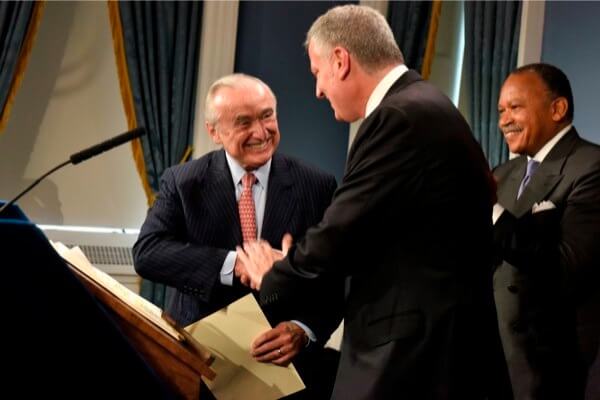By Patrick Donachie
NYPD Commissioner Bill Bratton announced his resignation from the department at a news conference this week where he and Mayor Bill de Blasio said NYPD Chief of Department Jimmy O’Neill would replace him in the job of top cop.
Bratton said he was leaving to take an opportunity in the private sector, which was later revealed to be the head of the risk management division at Teneo Holdings. He will leave the NYPD in September.
“It is a challenging time for police in America, and New York, even with all indicators pointing in the right direction,” Bratton said. “I try to leave each place with the bus headed in the right direction, with the right people on the bus, and, before I go, three or four people who are qualified to drive that bus.”
Bratton served as NYPD commissioner in two separate eras. He was hired as commissioner in 1994 by Mayor Rudy Giuliani after a year’s stint as commissioner of the Boston Department. He resigned two years later after disputes with Giuliani and served for seven years as the chief of the Los Angeles Police Department.
De Blasio said Bratton told him of his decision to resign July 8. After numerous consultations in the following weeks, de Blasio offered O’Neill the job about 16 hours before the noon press conference.
O’Neill has served the NYPD for more than 30 years and was appointed chief of department on Nov. 3, 2014. He is a proponent of the neighborhood policing strategy being applied throughout city precincts. During a National Night Out event in Astoria Tuesday evening, the mayor and Bratton announced that neighborhood policing would be expanded to 12 more precincts this fall, including the 103rd in Jamaica and the 114th in Astoria.
At the conference, de Blasio opined about the “intense bond” he developed with Bratton during the course of his first term and lauded the progress he believed they accomplished together.
“When we think about the 31 months – we came into office, all of us together, with the goal of doing two things that many said could not be done at the same time – driving down crime while repairing some of the rift between police and community,” de Blasio said. “We said both of those things have to happen.”
Bratton has long been associated with the policy of “broken windows,” which targets quality-of-life abuses as the first step in spiraling crime. Critics, including Communities United for Police Reform spokesman Anthonine Pierre, said these practices negatively affected New Yorkers and deplored Bratton’s reaction to accusations of police brutality.
“Bratton’s failure to hold police officers accountable when they unjustly kill or brutalize New Yorkers only perpetuates the police abuses and killings roiling this nation,” he said. “There should be no delusion of systemic change at the NYPD under his tenure.”
A day prior to the announcement, the group Millions March NYC initiated a sit-in outside City Hall protesting police misconduct and harassment. Their demands included, among others, for Bratton to be fired, though de Blasio said at the conference that Bratton’s resignation was “110 percent” unrelated to protests or recent corruption investigations into the NYPD.
Assorted officials responded to Bratton’s resignation, including Rep. Carolyn Maloney (D-Astoria).
“Under his leadership, crime in our great city has declined to historic lows, thousands of new officers have been trained to protect our streets, and the NYPD’s technological capabilities have been enhanced,” she said. “While Commissioner Bratton’s tenure is now coming to an end, he will long be remembered for his dedication to the people of New York.”
Patrolmen Benevolent Association President Patrick Lynch wished Bratton well in his new endeavours in a statement posted on the PBA site.
“We hope that Chief O’Neill will make supporting and protecting police officers on the street his first priority when he assumes his new role,” he wrote. “We look forward to working with him to make sure that New York City police officers are fully supported, with the fair compensation, staffing, equipment and training that we need to protect all New Yorkers.”
Councilman Rory Lancman (D-Hillcrest) saw Bratton’s resignation as an opportunity to have a dialogue about questions of the NYPD’s conduct.
“We remain overpoliced, particularly in communities of color, and Mayor de Blasio must confront this problem directly,” he said in a statement. “This was a conversation Commissioner Bratton resisted, but one which New York City, like the rest of the country, demands.”
Reach reporter Patrick Donachie by e-mail at pdona




































